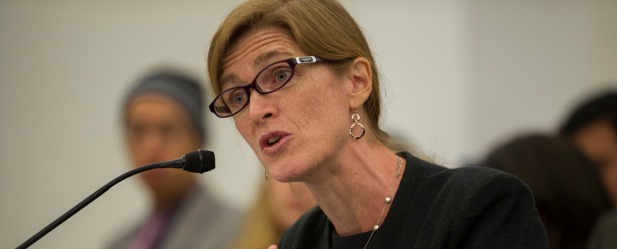( Samantha Power speaking to press in Colombo)
As Washington continues to embrace Sri Lanka’s new government, it’s important to remember that America’s next president is unlikely to shake up ties.
Sri Lanka’s President, Maithripala Sirisena, will soon complete his first year in office and many promises remain unfulfilled. More recently, we’re now hearing talk about the creation of a special court to handle alleged wartime abuses and the drafting of a new constitution.
Would expecting genuine progress on either of the aforementioned fronts be realistic? After all, there remain other, less complicated aspects of reform that the Sirisena administration has yet to address, such as the matter of Tamil political prisoners. Given Colombo’s unwillingness to address some of the more straightforward matters, is it reasonable to believe that more complex changes are viable at this time?
Regrettably, the United States continues to make platitudinous remarks about further reform, accountability and reconciliation in Sri Lanka. It’s time to think about Washington’s remarks in a different way. Is the Obama administration willing to do anything substantial if Sirisena’s reform agenda continues to flounder? Has the United States already decided that the progress thus far is sufficient? If that decision hasn’t already been made, what actions could Obama’s team conceivably take over the next 12 months to further pressure Colombo?
Let’s get real. Under Obama’s watch, the United States played a major role in pressuring Sri Lanka to respect human dignity and deal with the past. And, while Mahinda Rajapaksa (the previous president) responded to international pressure, his regime was always focused on doing the bare minimum to placate the international community.
Now we’ve got Sirisena and, somewhat incredibly, a coalition government where the country’s two principal political parties – the Sri Lanka Freedom Party (SLFP) and the United National Party (UNP) – have entered into a power-sharing arrangement.
A few lines of thinking are permeating Washington’s corridors of power at the moment. Obama’s team has been promoting Sri Lanka’s new government while concurrently assessing its own role in a self-congratulatory fashion. Indeed, it appears that the administration is reliving Myanmar’s “democratic opening” from a few years ago and concomitantly ignoring the lessons that we can and should learn from Myanmar – starting with the fact that deeper, lasting reform is always more complicated and difficult than it at first appears.
The Obama administration will be out of power in about a year’s time. Even if the Sirisena administration makes more significant strides in the right direction over the next 12 months, Sri Lanka’s complicated reform agenda, including transitional justice, will be far from finished in January 2017. And, frankly, there’s no guarantee that an incoming U.S. administration, Republican or Democrat, would want to elevate human rights or accountability in Sri Lanka the way that the Obama administration did from 2012-2014.
Aside from Obama’s obvious legacy concerns, Colombo’s political leadership likely understands that an upcoming transfer of power in Washington would probably not change the current trajectory of bilateral ties. Given the way that U.S.-Sri Lanka relations have been shifting, would a Hillary Clinton administration really want to intensify pressure on Colombo? And most of the leading Republican contenders have little knowledge of foreign affairs anyway. Would any of them want to prioritize justice and accountability vis-a-vis a small island nation in the Indian Ocean?
Irrespective of who wins the White House in 2016, Sri Lanka’s human rights and accountability issues are unlikely to receive the amount of attention that the Obama administration has devoted to them – which makes Obama’s swift resetting of U.S.-Sri Lanka ties that much more unfortunate.
